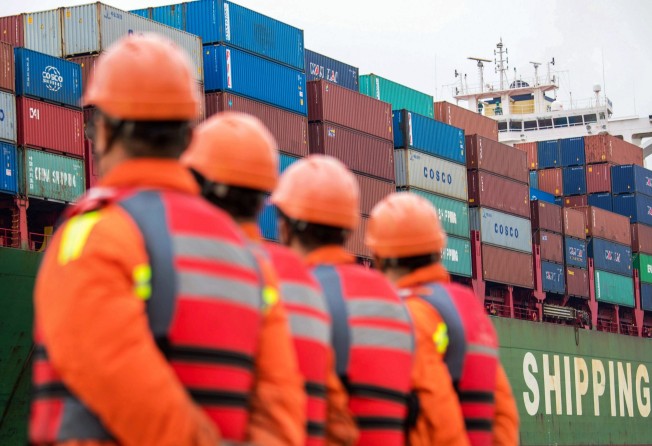Hong Kong, China stocks fall on worse-than-expected trade data out of mainland as trade war bites
- China exports plunged 4.4 per cent in December from same period last year
- Meanwhile, China doubles quota for overseas investors in country’s equities

Worse-than-expected trade data out of China sent Hong Kong and mainland stocks tumbling on Monday, highlighting the damage of the US-China trade war on the world’s second-largest economy coupled with a domestic slowdown.
The Hang Seng Index declined 1.4 per cent, or 368.94 points, to close at 26,298.33, after it recorded its biggest weekly gain since early November last week. The Shanghai Composite Index dropped 0.7 per cent, or 18.07 points, to 2,535.77.
“We are seeing the impact of US-China trade tensions finally reflected in China’s trade data,” said Gordon Tsui Luen-on, managing director of financial advisory firm Hantec Pacific.
“We didn’t feel much of impact during the early stage because trade data was still pretty good back then. Now the data suddenly plunged so much and the market has turned more pessimistic,” Tsui said.
China’s export growth plunged 4.4 per cent in December from the same period last year, in contrast to a 2 per cent growth forecast by economists polled by Bloomberg and a 5.4 per cent rise in November.
Imports contracted with a 7.6 per cent year-on-year decline, far from the projected 4.5 per cent expansion and the 3 per cent growth recorded in the previous month.
That was the largest monthly decline since July and December 2016 for imports and exports, respectively, and signals the US-China trade war’s true damaging effects on China amid a slowing economy.
Exports had previously held up steadily, partly thanks to front-loading effects as exporters hurried to fulfil US orders before rounds of tariffs kicked in.
The disappointing import data added to concerns over weakening demand from China as the domestic economy loses steam.
Meanwhile, China’s trade surplus with the US jumped 17 per cent to a historical high of US$323 billion in 2018 from the year before.
Also Monday, China’s foreign exchange regulator doubled the quota under the qualified foreign institutional investors (QFII) programme to HK$300 billion, in a move that allows global capital a bigger share of the country’s 45 trillion yuan (US$6.7 trillion) A-shares market.
China’s stock market has seen increasing interest from international funds, after index providers such as MSCI and FTSE Russell announced plans to expand the weighting of Chinese shares.
On the back of the trade data, traders dumped exporters and consumer discretionary companies.
Shenzhou International Group, China’s largest knitwear manufacturer and exporter, fell 2.4 per cent to HK$89.7.
Carmakers took a beating too, as official data released on Monday showed China’s annual car sales declined last year for the first time in nearly 20 years, dropping 4.1 per cent to 23 million units. Geely Automobile Holdings declined 3.1 per cent to HK$10.76.
Macau casino operators were also under pressure on worries over traditionally lower revenue ahead of the Lunar New Year. Sands China dropped 2.8 per cent and Galaxy Entertainment Group was down 3.6 per cent.
Benchmark heavyweight Tencent Holdings declined 2.8 per cent to HK$321.8, after the stock had rebounded over 30 per cent from an October low. Tencent’s short-sell ratio surged above 40 per cent, the highest since December 2015.
France-based cosmetics retailer L’Occitane International SA dropped 4.7 per cent to HK$14.52 in Hong Kong, after announcing it had agreed to buy beauty brand Elemis for about US$900 million to expand in the US and the UK.
“The market thought the deal valuation was rich and would like to get more clarity on how sustainable the growth momentum and high profitability could be. There are also questions on whether the founders and the team will continue to stay and how much synergies there are with L’Occitane’s existing team and brands,” said Mariana Kou Chung-yin, head of China education and Hong Kong consumer research for CLSA.
“As the team was the main driving force behind the 26 per cent sales growth, if the team would leave then there will be uncertainty on whether the company’s growth rate will be sustainable.”
Lenovo Group, the world’s top personal computer producer, bucked the downward trend and surged 5.3 per cent to HK$5.73 after Goldman Sachs lifted its rating of the stock.
The weak trade data and the recent dismal reading of China’s manufacturing purchasing managers’ index is a clear indication of China’s suffering export businesses, according to Kenny Tang Sing-hing, chief executive of China Hong Kong Capital Asset Management.
“Investors are all hoping the Chinese government will roll out more stimulus measures soon,” said Tang.
On top of trade data, investors weighed the latest arrest involving Huawei. The China telecommunications giant’s chief financial officer had earlier made international headlines when she was entangled in a sanctions fraud case in Canada. Then last Friday, it emerged that sales director Wang Weijing was arrested in Poland on suspicion of espionage. Huawei swiftly moved to fire and distance itself from Wang.
The latest arrest amplified concerns over increasing obstacles Huawei will face in conducting business in Europe, where many people associate the company’s technology with China spying activities.
Suppliers to Huawei paced the decline. Sunny Optical Technology dropped 1.6 per cent to HK$67.65, and AAC Technologies shed 1.2 per cent to HK$45.65.
Meanwhile, TS Wonders, a Singaporean snacks company, jumped 26 per cent to HK$0.63 in its debut trading from the offer price. The retail tranche of its initial public offering was 16.9 times oversubscribed, according to a filing to the stock exchange.